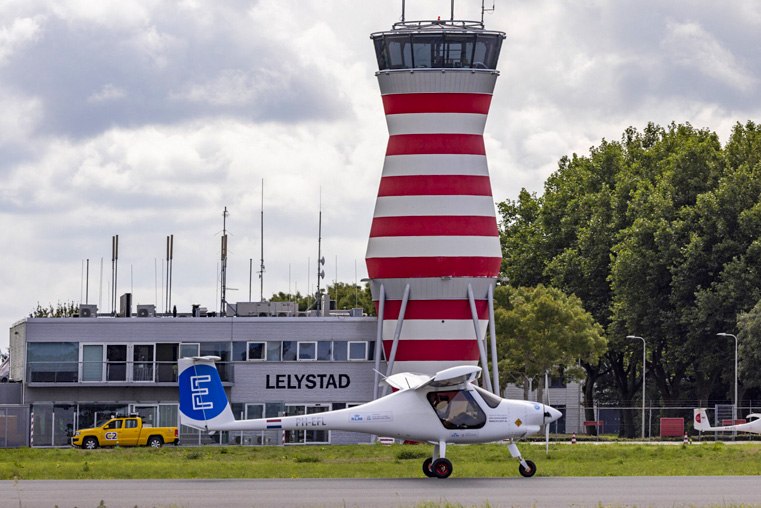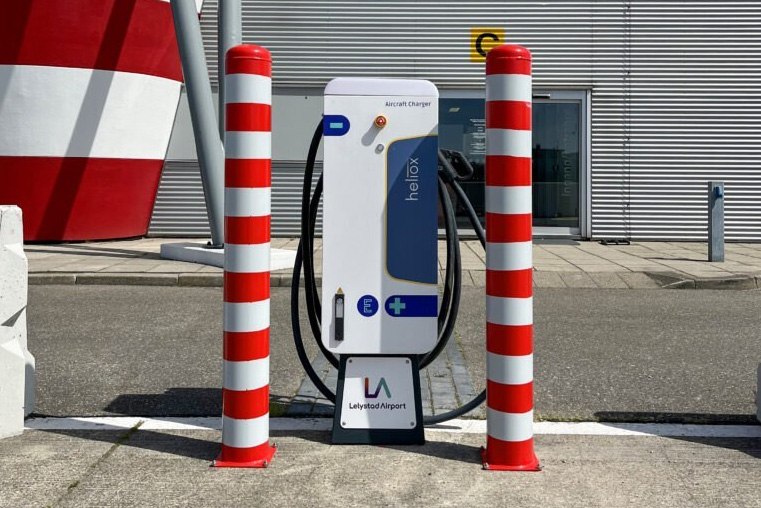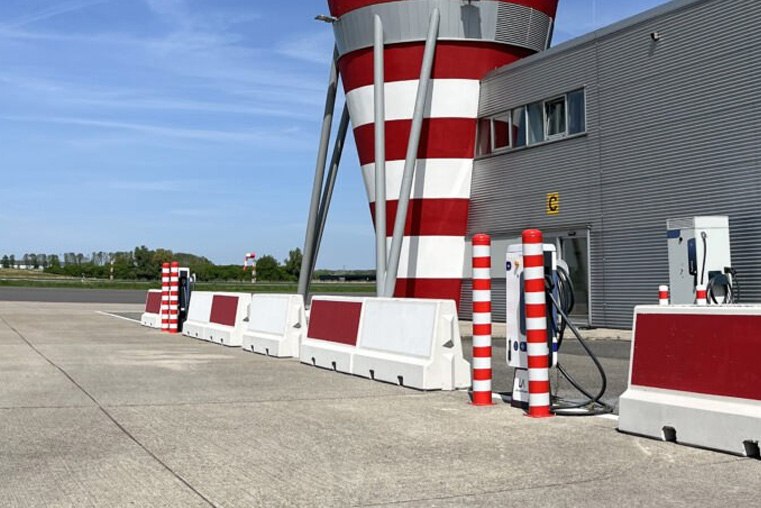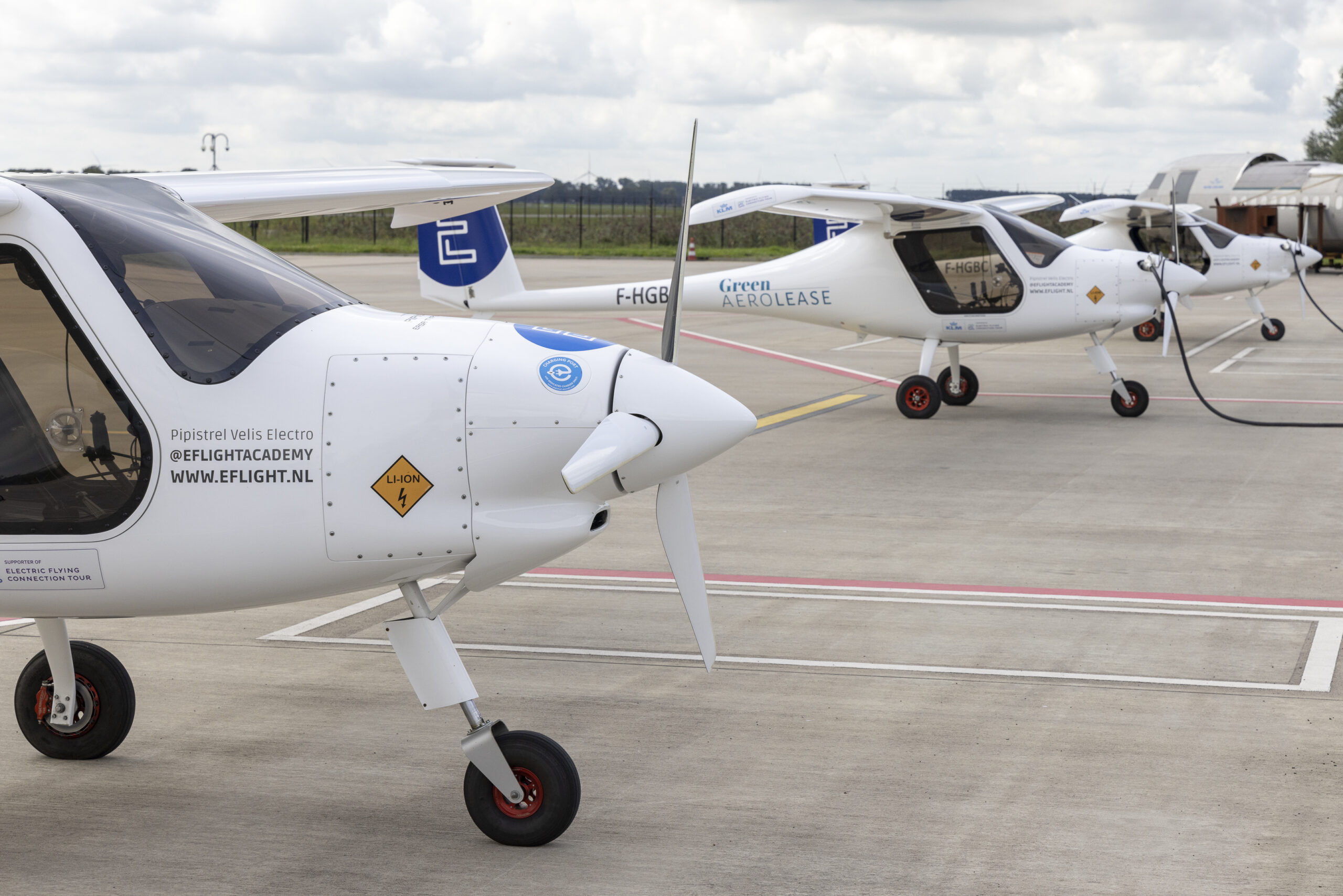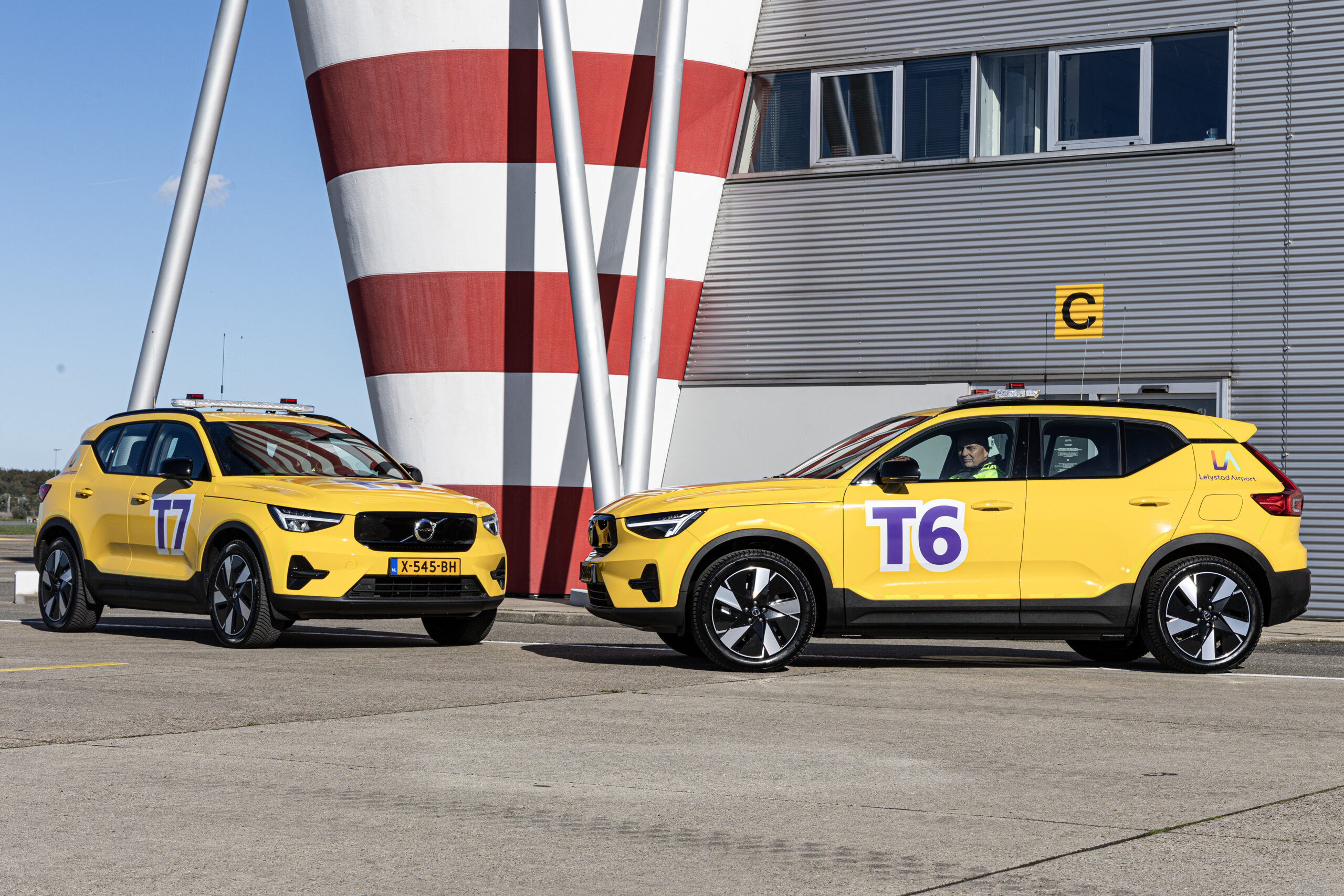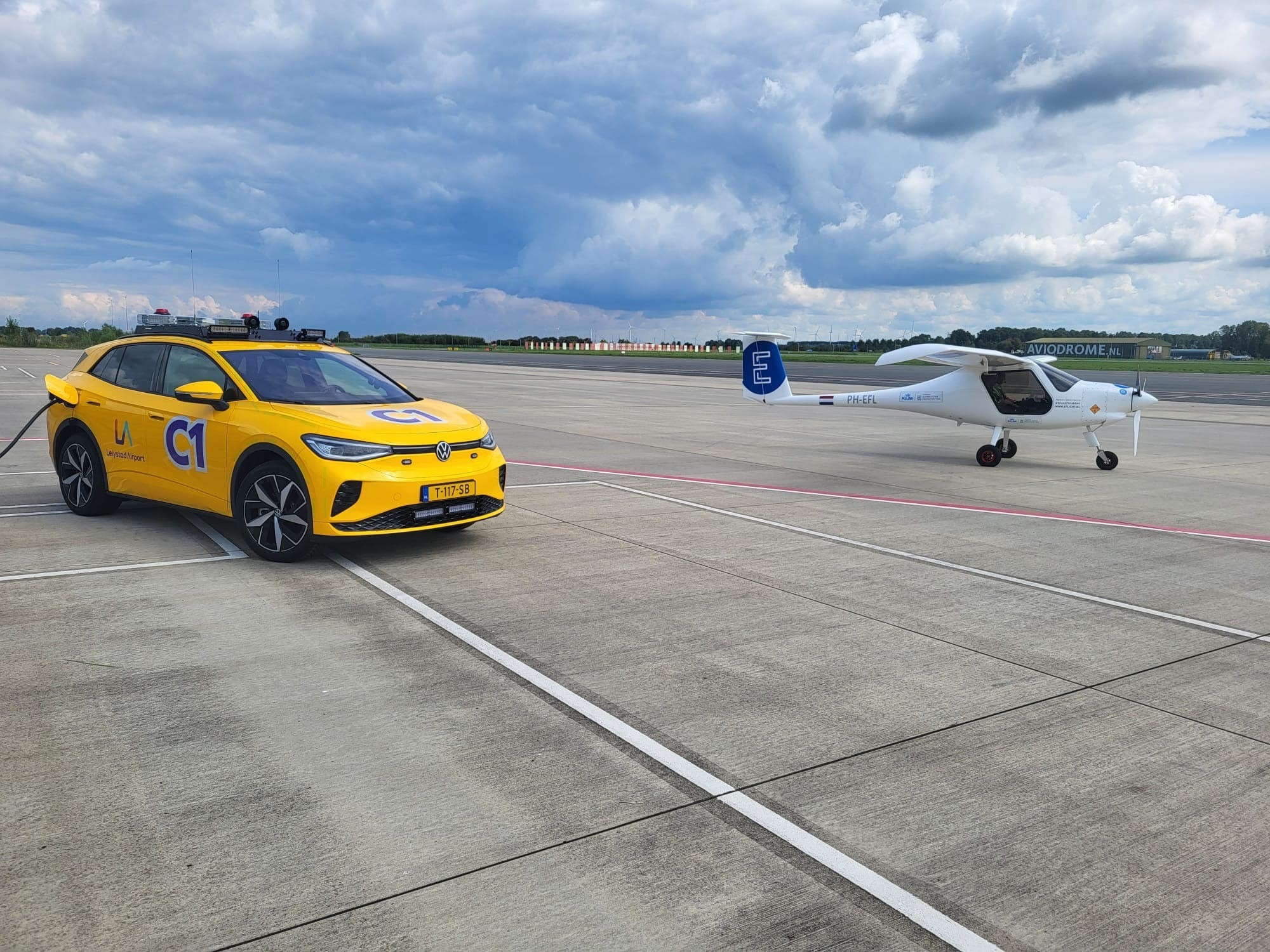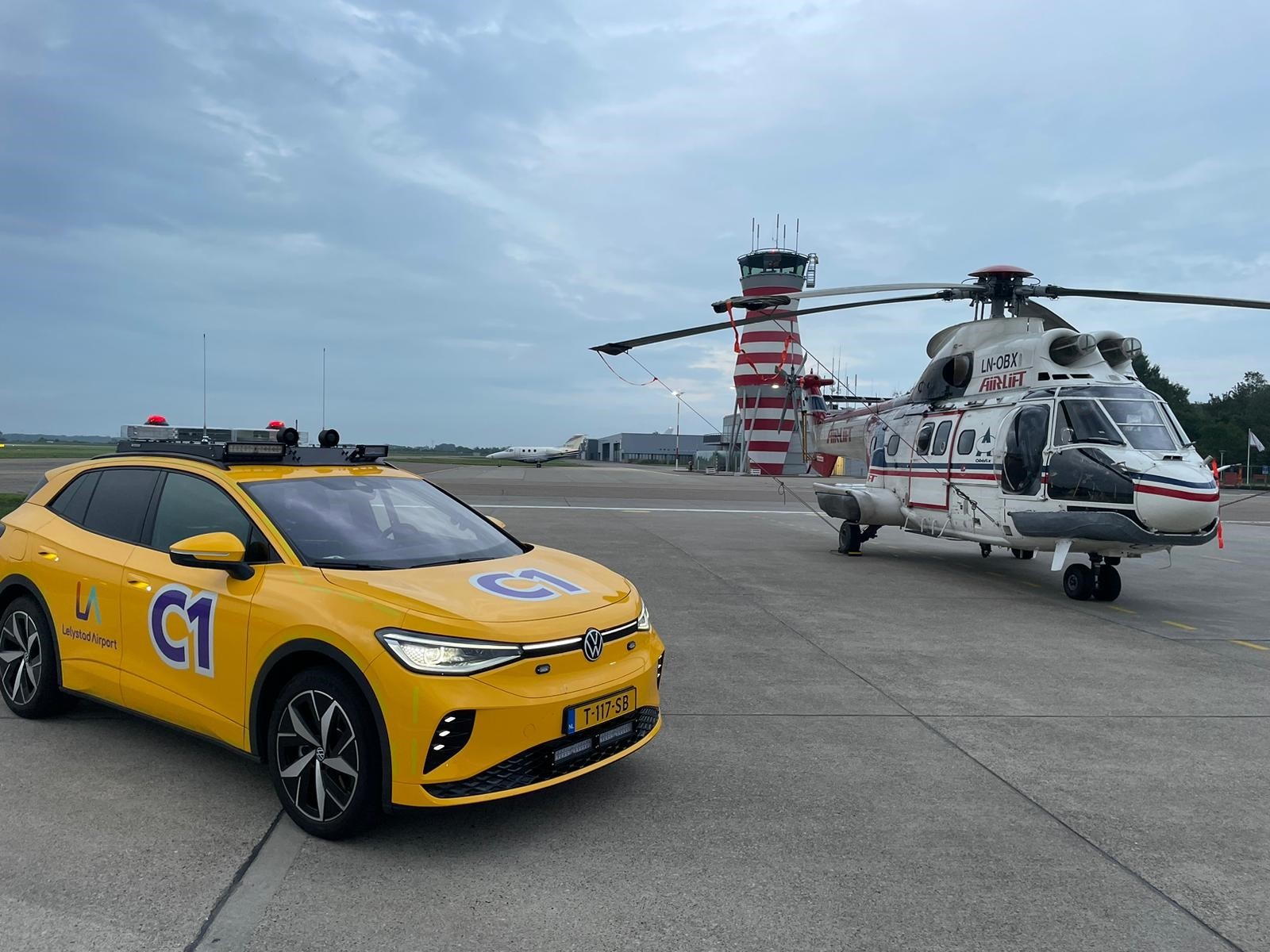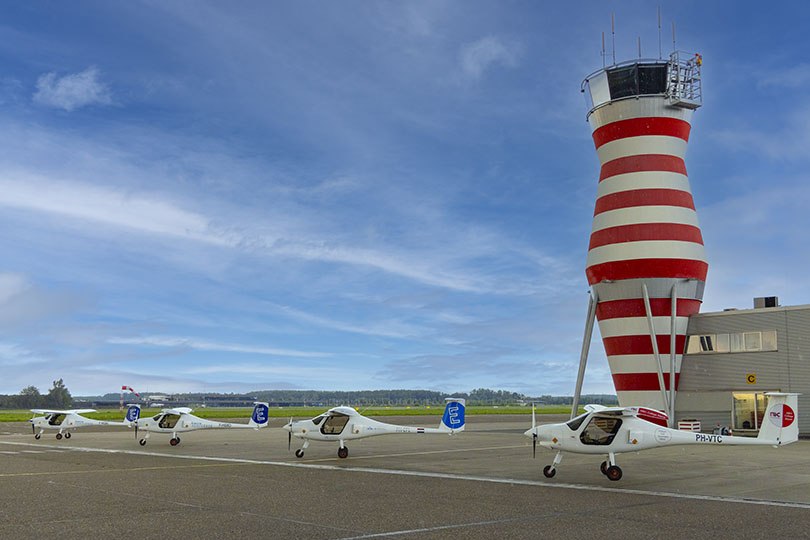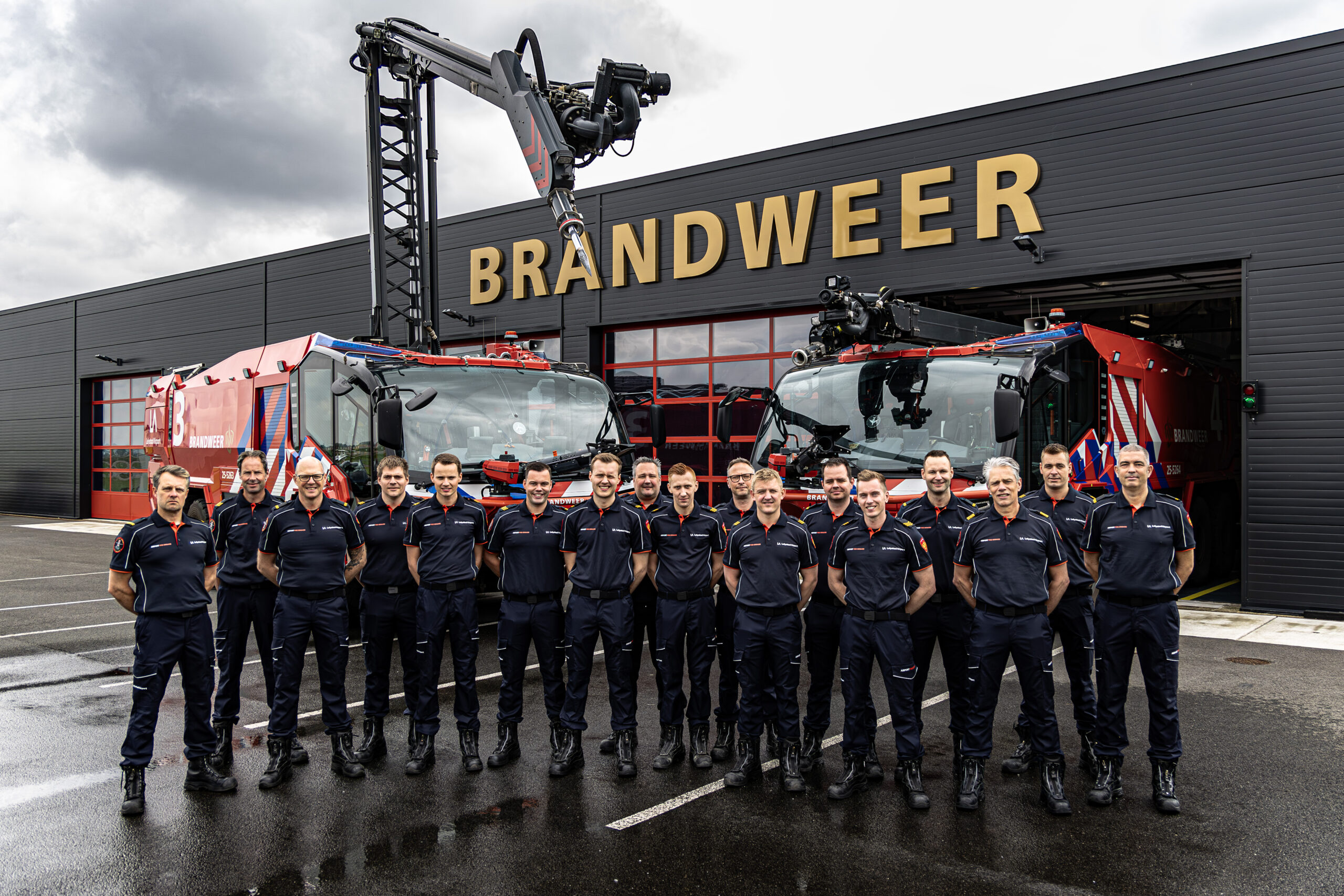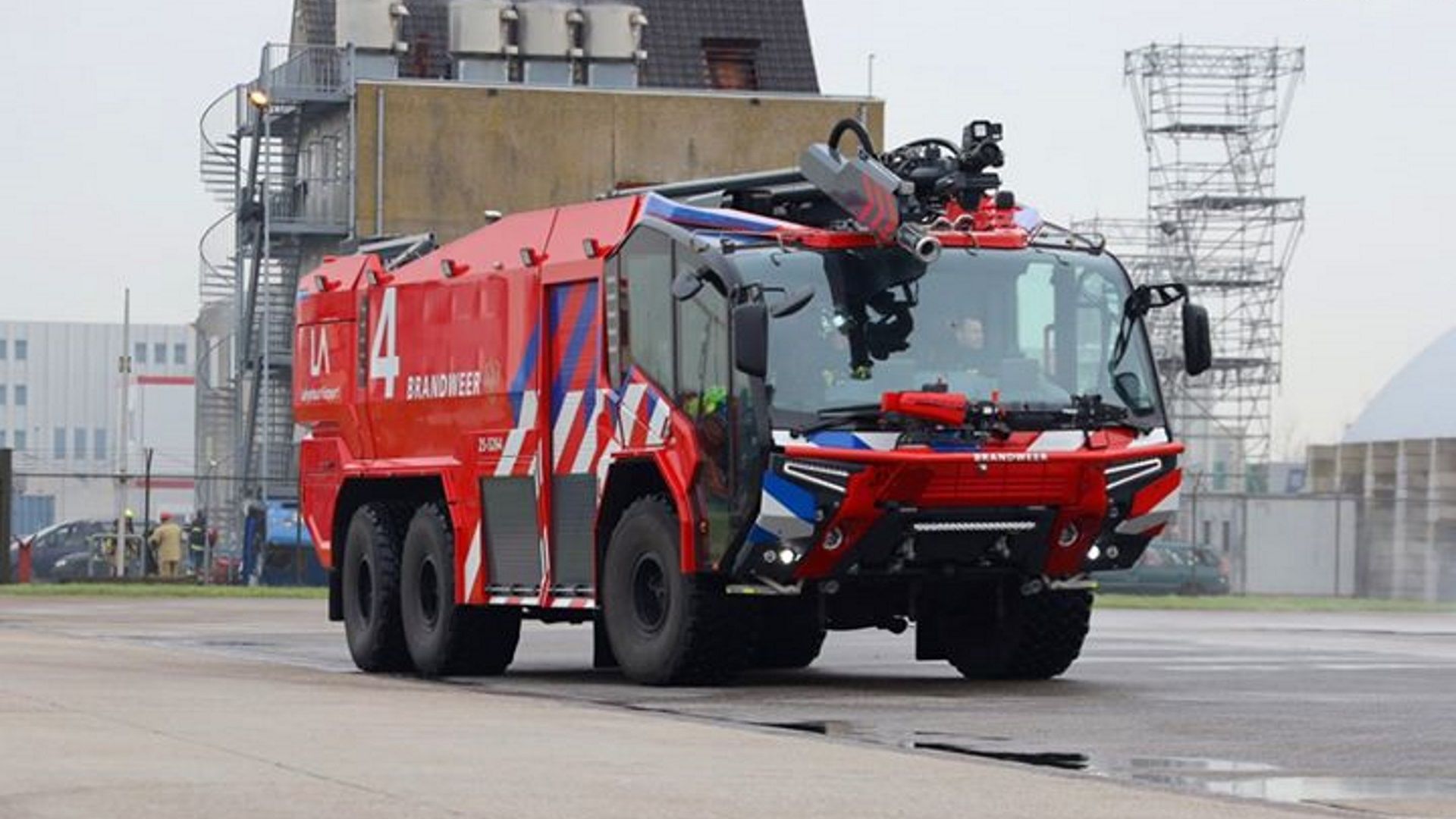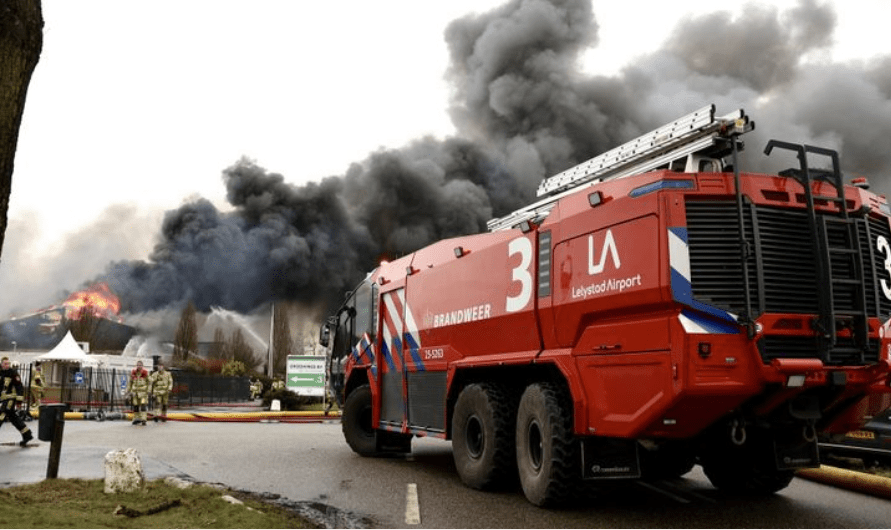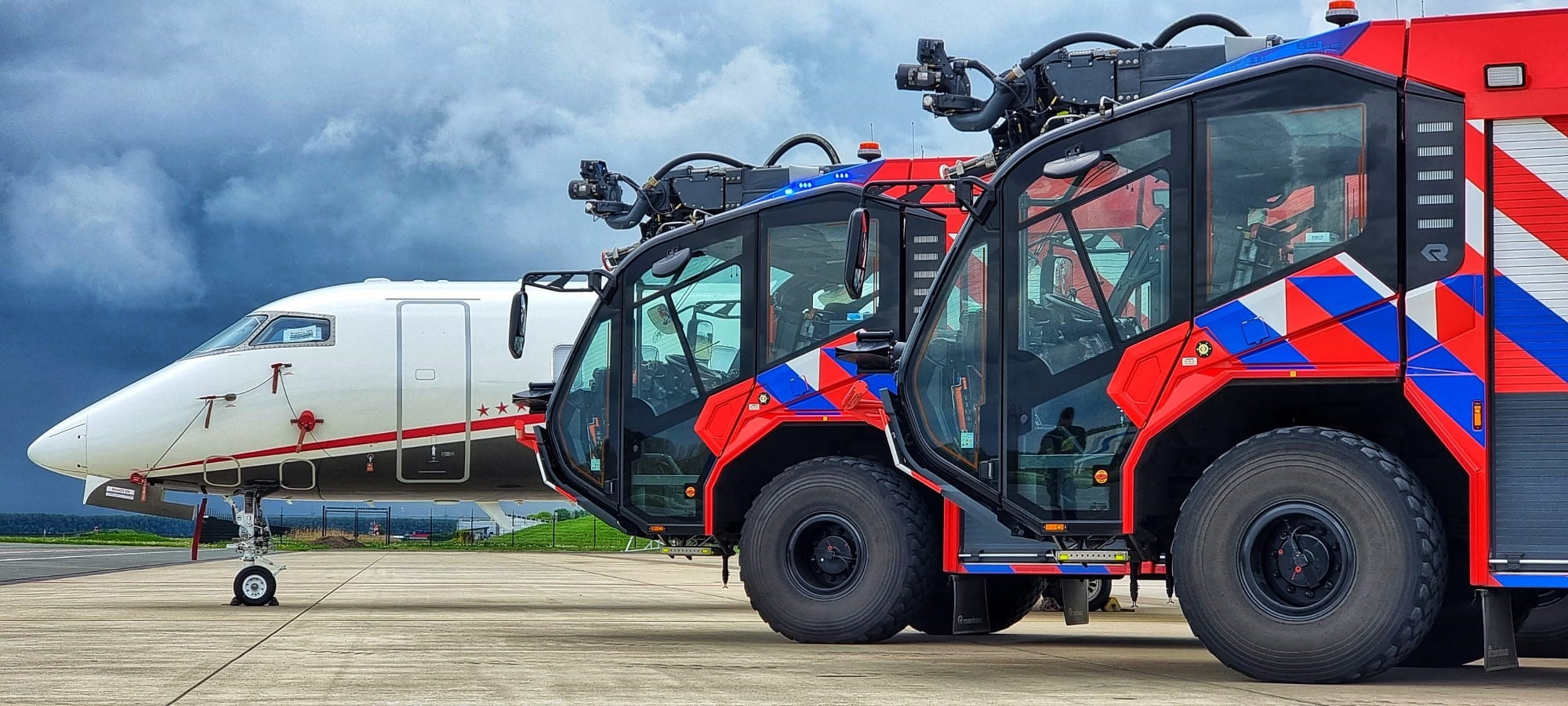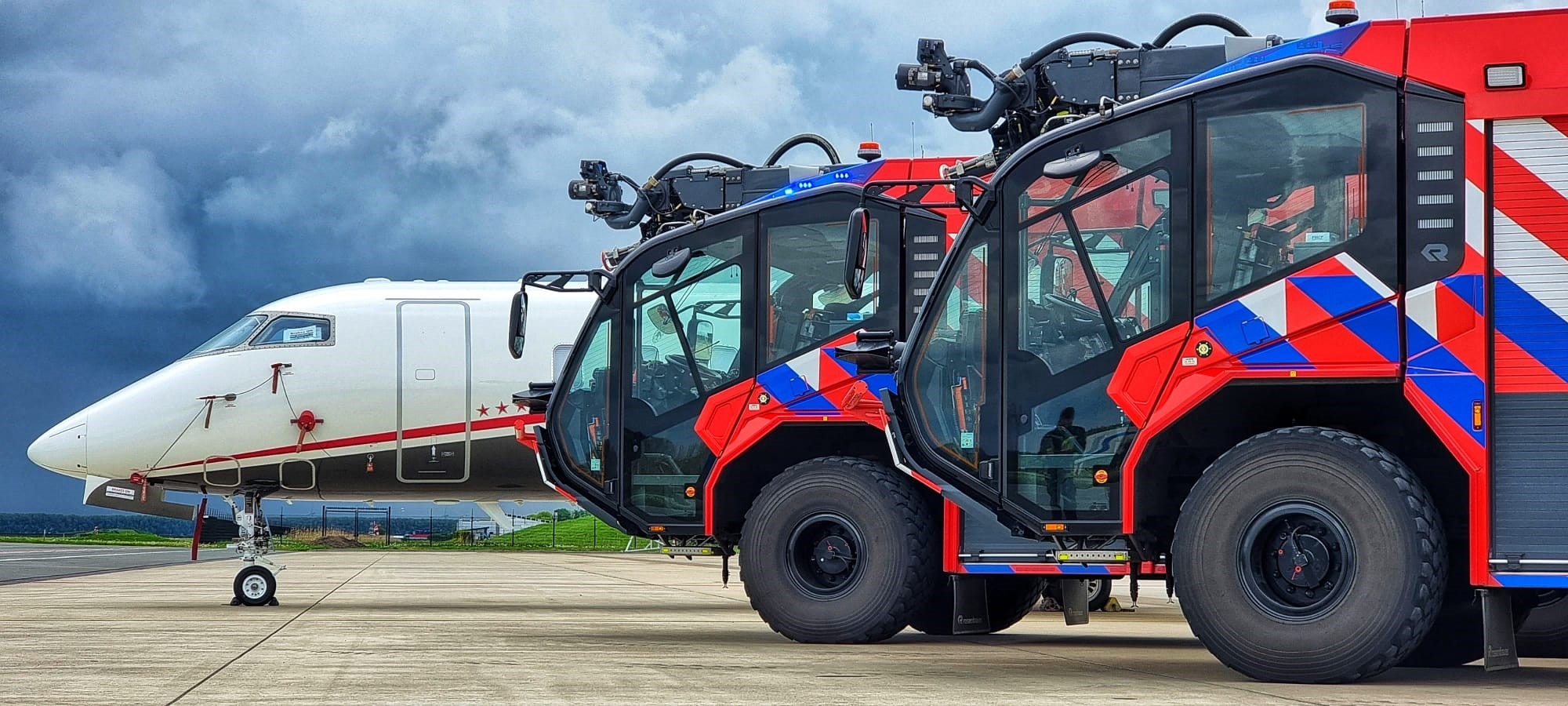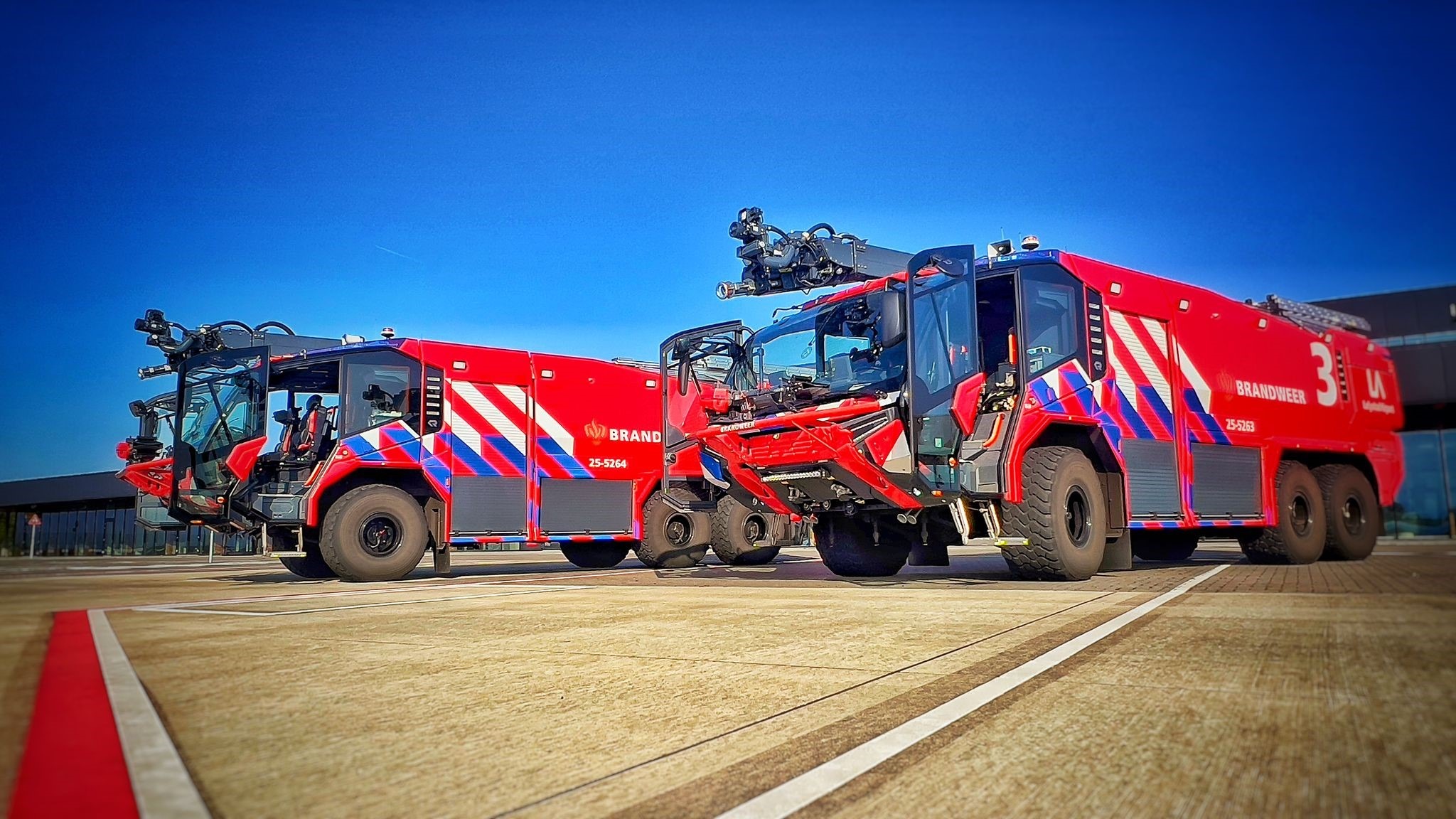Lelystad Airport, the most sustainable airport in the Netherlands
Lelystad Airport aims to be the most sustainable and innovative airport in the Netherlands. Together with our partners, we are working on new technologies and solutions that contribute to cleaner aviation and a future-proof region.
Navigate to
Charging station for electric aircraft at Lelystad Airport
Een belangrijke stap richting duurzamere luchtvaart
Op Lelystad Airport staat één van de eerste publieke laadstations voor elektrische vliegtuigen in Nederland. Met dit laadplein zet de luchthaven een belangrijke stap richting stillere en schonere luchtvaart en groeit zij uit tot een pionierslocatie voor elektrisch vliegen in Nederland én Europa.
Toekomstbestendige laadtechnologie
Het laadplein maakt het mogelijk om zowel elektrische vliegtuigen als elektrische voertuigen op het platform te laden. Dankzij universele CCS-snelladers en een EASA-gecertificeerde adapter kan dezelfde infrastructuur flexibel worden gebruikt, wat het systeem efficiënt en toekomstbestendig maakt. De eerste laadtesten zijn in augustus 2025 succesvol uitgevoerd, waarmee het laadstation volledig operationeel is.
Project Electrifly en landelijke samenwerking
Het laadplein in Lelystad maakt deel uit van Project Electrifly, een samenwerking tussen Provincie Flevoland, Lelystad Airport en NRG2fly. Het laadplein is gerealiseerd in samenwerking met Heliox en wordt ontwikkeld door NRG2fly, een pionier die werkt aan het eerste Europese laadnetwerk voor elektrische luchtvaart. Met een betrouwbaar en uitgebreid laadnetwerk worden elektrische vluchten mogelijk gemaakt en kan de technologie zich verder ontwikkelen en opschalen.
Doel is om Lelystad Airport te positioneren als innovatieve en toekomstbestendige luchthaven. Als centrale speler werkt de luchthaven mee aan de ontwikkeling van een landelijk dekkend netwerk van laadstations voor elektrische vliegtuigen, met de ambitie om dit op termijn op Europees niveau uit te rollen. Nederland leent zich hier perfect voor: met 17 luchthavens dicht bij elkaar kan relatief eenvoudig een netwerk ontstaan waarmee elektrische vliegtuigen het hele land kunnen doorkruisen.
Strategische positie van Lelystad Airport
Lelystad Airport speelt hierin een cruciale rol. De luchthaven heeft één van de twee laadpleinen in Nederland waar zowel elektrische vliegtuigen als Ground Support Equipment kunnen worden opgeladen. Bovendien vindt 16% van al het General Aviation verkeer in Nederland plaats op Lelystad Airport, waarmee het de drukste General Aviation-locatie van het land is. Dit maakt de luchthaven een logisch knooppunt voor de elektrificatie van de Nederlandse luchtvaart.
Impact op onderwijs en regio
Het initiatief heeft bovendien een belangrijke positieve impact op zowel het onderwijs als de regionale ontwikkeling. Het ROC van Amsterdam-Flevoland heeft een volledig elektrisch Pipistrel-vliegtuig op de luchthaven gestationeerd voor opleidingsdoeleinden, waardoor studenten praktijkervaring opdoen met duurzame vliegtuigtechniek. Daarnaast trekt het netwerk internationale pioniers en fabrikanten aan die Lelystad Airport gebruiken als testlocatie voor nieuwe technologieën.
Naar de luchtvaart van morgen
Met het laadplein bouwt Lelystad Airport – samen met partners – aan de luchtvaart van morgen: stiller, schoner én slimmer

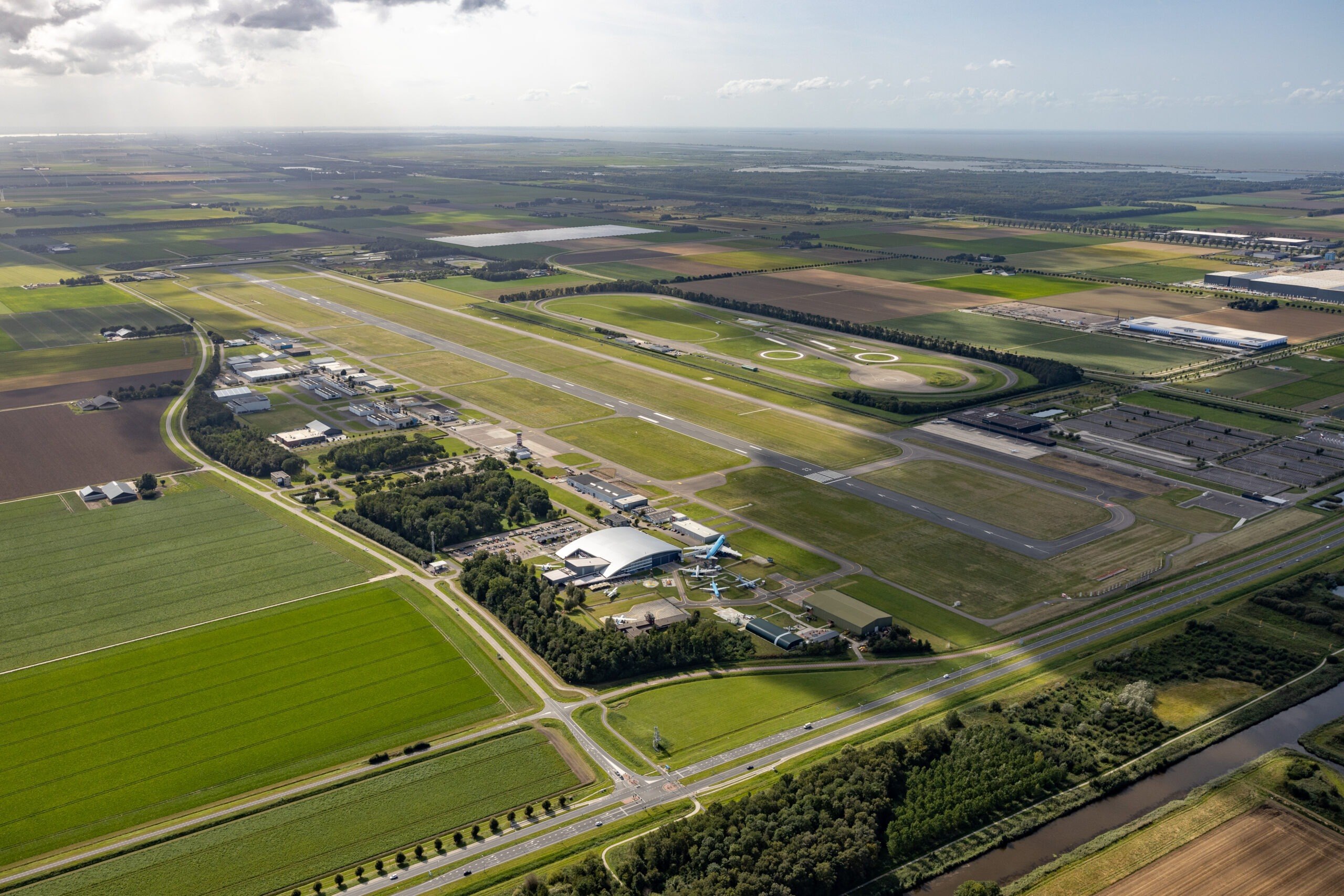
Lelystad Airport Innovation Area (LAIA)
Lelystad Airport Innovation Area (LAIA) is het innovatiegebied rond Lelystad Airport. Hier werken bedrijven, onderwijs en overheden samen aan duurzame innovaties voor de luchtvaart van de toekomst. Het doel: vliegen schoner, stiller en slimmer maken én nieuwe kansen creëren voor de regio.
Wat is LAIA?
LAIA is een plek waar toekomstgerichte initiatieven kunnen worden ontwikkeld, getest en toegepast. Innovaties worden hier in de praktijk uitgeprobeerd, zodat we snel kunnen zien wat werkt. Dit helpt om een duurzamere luchtvaart bereikbaar te maken en zorgt voor nieuwe banen en opleidingen in Flevoland.
Waar werken we aan?
Binnen LAIA richten we ons op drie belangrijke ontwikkelingen:
- Duurzamere luchtvaart
Bijvoorbeeld elektrisch vliegen, eVTOLs, drones en stillere vliegtechnieken. - Duurzame brandstoffen
Zoals synthetische kerosine, waterstof en hybride oplossingen. - Digitale en autonome systemen
Denk aan slimme technologie, robotisering en systemen die zelfstandig kunnen werken.
Wat maakt LAIA uniek?
LAIA bestaat uit vier onderdelen die het innovatiegebied sterk maken:
- Een levende proeftuin
De luchthaven en omgeving worden gebruikt als testgebied. Hier kunnen nieuwe vliegtuigen, brandstoffen, drones en slimme systemen veilig worden uitgeprobeerd en opgeschaald. - Slimme energiehub
Rond de luchthaven wordt gewerkt aan duurzamere energie: opwekken, opslaan en slim verdelen. Hierdoor kunnen bedrijven en de luchthaven in de toekomst meer elektrisch werken. - Toegepast onderwijs
Studenten van mbo, hbo en universiteiten leren hier in de praktijk en werken mee aan echte innovatieprojecten. Zo worden zij voorbereid op de banen van morgen. - Een sterk verbonden regio
LAIA werkt samen met bedrijven en steden in Flevoland en daarbuiten. Door kennis en ervaring te delen, kunnen innovaties sneller groeien en een bredere impact hebben.
Waarom is dit belangrijk?
LAIA helpt om een duurzamere luchtvaart mogelijk te maken. Maar het levert onze regio ook veel op:
- nieuwe kennis en opleidingen
- samenwerking tussen bedrijven
- meer innovatie en werkgelegenheid
- een toekomstbestendige economie.
Samen bouwen aan de toekomst
Overheden, bedrijven en onderwijs werken binnen LAIA nauw samen. Door kennis te bundelen en ruimte te bieden om te testen en te ontwikkelen, zorgen we ervoor dat Lelystad en Flevoland voorop blijven lopen in duurzame en innovatieve ontwikkelingen.

Sustainability update Royal Schiphol Group
Royal Schiphol Group published an update of its sustainability plans on 30 September 2025.
View the Sustainability Update here (PDF).
EFC en Lelystad Airport samen op koers naar elektrisch vliegen
De Electric Flying Connection (EFC) is een netwerk van luchthavens, luchtvaartmaatschappijen, kennisinstellingen en bedrijven dat zich inzet voor de ontwikkeling en opschaling van elektrisch vliegen op regionale afstanden. Lelystad Airport is sinds mei 2024 lid van dit netwerk en draagt als partner actief bij aan de transitie naar een duurzamere luchtvaart.
Wat is EFC?
De missie van EFC is om de toekomst van mobiliteit te veranderen door een sterk netwerk van organisaties op te bouwen die samen een complete waardeketen voor elektrisch vliegen realiseren. Daarbij gaat het om de ontwikkeling van nieuwe elektrische vliegtuigen en het ombouwen van bestaande toestellen, maar ook om het transformeren van regionale luchthavens tot mobiliteitshubs die draaien op duurzame energie.
Daarnaast werkt EFC aan de aanleg van moderne laadinfrastructuur, het opstellen van internationale standaarden en het stimuleren van elektrische vliegscholen en luchtvaartopleidingen. Door kennis en ervaring uit de elektrische auto-industrie te benutten en nauw samen te werken met overheden, toezichthouders en onderwijsinstellingen, wil EFC elektrisch vliegen uit de pioniersfase halen en klaarmaken voor grootschalige toepassing.
Met deze missie bouwt EFC aan een innovatief vervoerssysteem voor de toekomst – en Lelystad Airport is er trots op hierin een actieve rol te spelen.
Rol van Lelystad Airport
Lelystad Airport levert als test- en leeromgeving een belangrijke bijdrage. De afgelopen jaren hebben we ruimte geboden voor praktijkervaringen die de basis vormen voor de volgende stappen:
- Proefvluchten Lelystad Airport ↔ Schiphol-Oost
In 2023 vonden achttien proef- en trainingsvluchten plaats met de elektrische Pipistrel Velis Electro. Deze vluchten, uitgevoerd in samenwerking met E-Flight Academy, KLM en EFC, leverden waardevolle inzichten op in logistiek, laadtijden en operationele processen. - Laadinfrastructuur en energievoorziening
Via partners binnen EFC wordt gewerkt aan de ontwikkeling van slimme laadsystemen en energieoplossingen. Daarmee bereiden we ons voor op een toekomst waarin elektrische vliegtuigen een vast onderdeel vormen van onze operatie. - Power Up-consortium
Samen met andere luchthavens en luchtvaartpartners zijn we aangesloten bij het Power Up-consortium. Doel is om operationeel klaar te zijn voor de eerste commerciële elektrische passagiersvluchten binnen Nederland en naar omliggende landen.
Vooruitblik
Door onze samenwerking binnen EFC kunnen we kennis delen, infrastructuur verbeteren en innovaties versnellen. Zo versterken we onze positie als proeftuin voor een duurzamere luchtvaart in Nederland en Europa. Samen zetten we koers naar een duurzamere toekomst, waarin elektrisch vliegen een realistisch en betrouwbaar alternatief wordt voor korte en middellange afstanden.
Kijk ook de video: “Join The Electric Flying Connection”
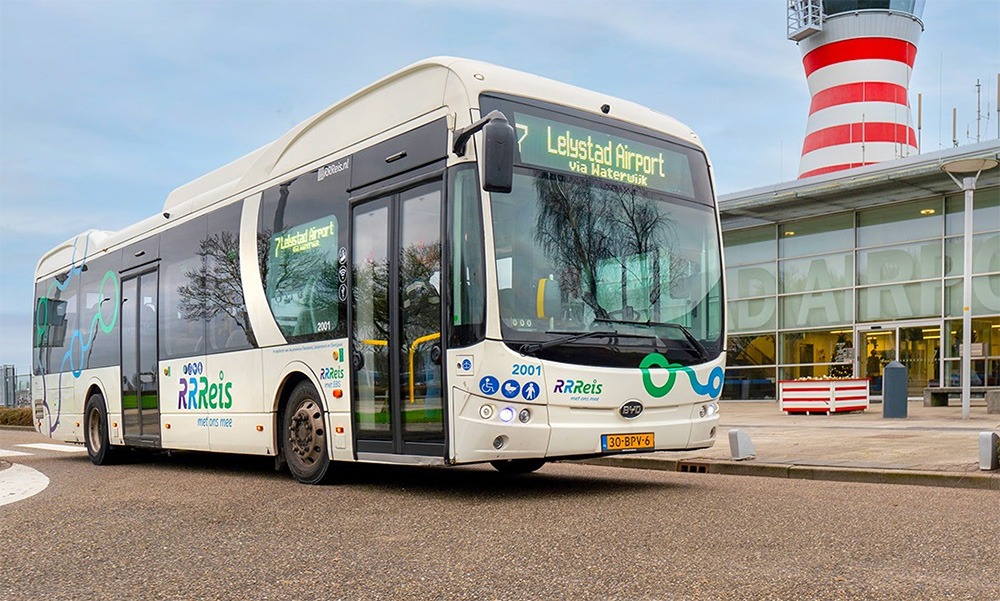
EBS bus transport to start electric charging at Lelystad Airport
Lelystad Airport has signed a lease agreement with the public transport company EBS for a newly constructed charging station for 28 electric buses. This will allow EBS to commence electric bus transportation in and around Lelystad starting from December 10, 2023, replacing the current diesel buses.
EBS and Lelystad Airport entered this partnership because EBS couldn’t find a suitable location for its charging station due to capacity constraints on the energy grid. Therefore, Lelystad Airport is willing to provide a portion of its capacity to enable electric bus transportation in the region in a timely manner.
EBS is currently in the process of installing the charging station near the new passenger terminal.
This collaboration contributes to the region and province’s interests and aligns perfectly with Lelystad Airport’s sustainability strategy. The contracting authority, Provincie Flevoland, EBS, and Lelystad Airport are pleased with this sustainable partnership and look forward to EBS’s electric buses hitting the road on schedule.
LED lighting on runway and taxiway
In 2018, Lelystad Airport has been fully equipped with CEDD AGL technology by THK Airport Solutions. To prepare the airport for commercial traffic, the runway was extended and air traffic control as well as an instrument landing system were introduced. The airfield ground lighting on the runway, taxiways and apron areas were upgraded with CEDD airfield ground lighting technology.
The fast response times of the CEDD technology, with feedback within 500 ms, make the airport operations faster and safer than with traditional airfield lighting technology. Furthermore, due to the lack of transformers and connectors, the technology is far more resistant against water ingress in pits and conduits.
Learn more about airfield products of THK Airport Solutions.
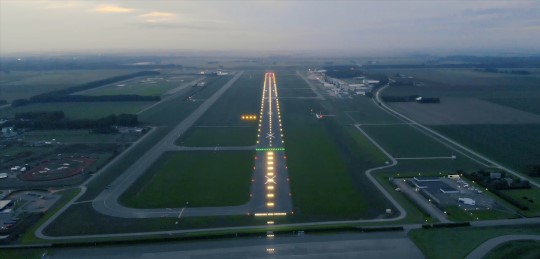
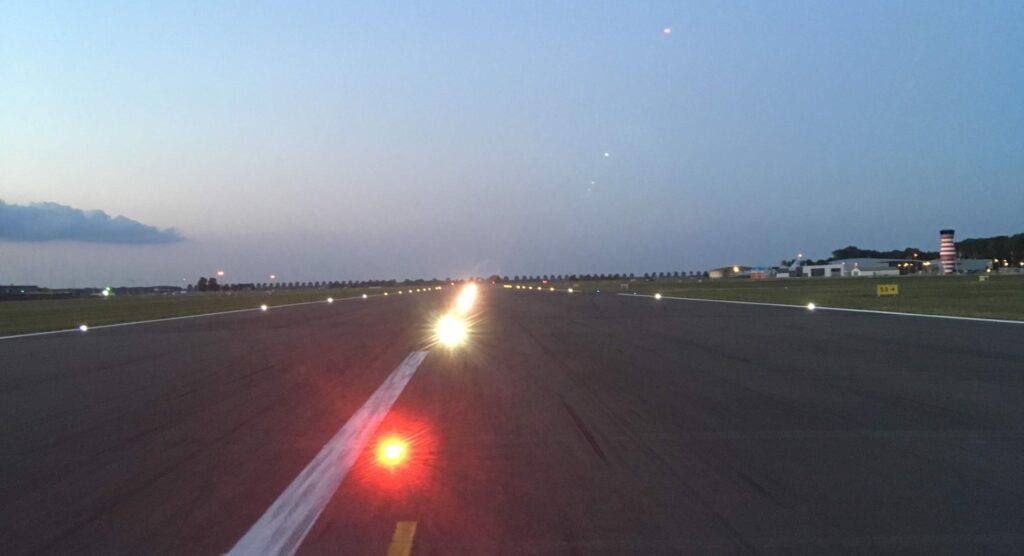
Fieldlab ROC training with electric aircraft
MBO College Airport Hoofddorp is part of ROC van Amsterdam | Flevoland and has a field lab at Lelystad Airport focused on sustainable aviation. Students work with a fully electric aircraft, the Pipistrel.
New fleet of electric vehicles for operational service
The daily operational service at the airport is carried out almost entirely electrically. The new fleet of electric cars makes the airport even more efficient and sustainable.
Electric flying between Lelystad Airport and Schiphol Airport
In the summer of 2023, 18 individuals had the opportunity to fly from Lelystad Airport to Schiphol in a Pipistrel Velis Electro with an instructor from E-Flight Academy. This initiative was a collaboration between Electric Flying Connection (EFC) and E-flight Academy with KLM as a partner.
The goal was to explore what electric flying means for logistics and the required infrastructure. Lelystad Airport’s central location, accessibility, and high-quality electrical infrastructure played a significant role in this event.
With this exciting event, Lelystad Airport contributed to insights into the electrical infrastructure and recharging of electric aircraft, which is necessary for electric aviation. To further advance aviation sustainability, all stakeholders in the industry must experiment with new technologies and innovations in practice.
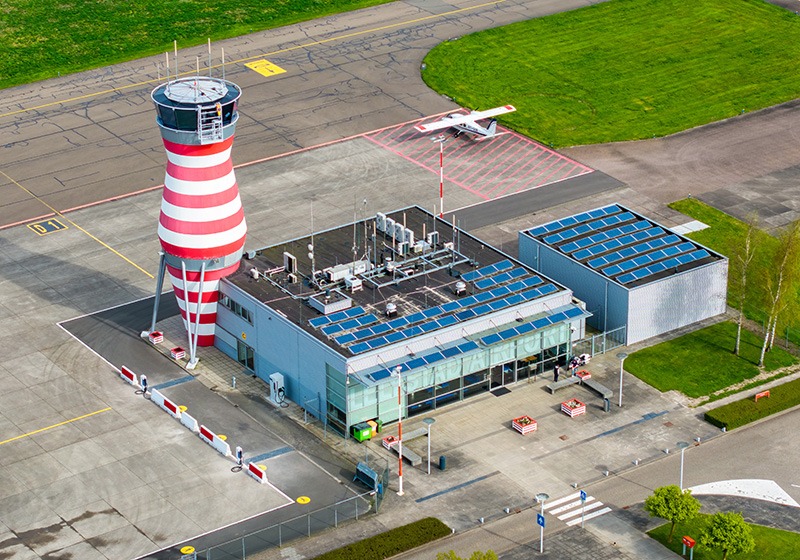
Solar energy from own site
There are solar panels on the buildings at Lelystad Airport. They fit our ambition to generate sustainable energy on our own site. More and more will be added in the coming years. This makes the solar panels a good addition to wind and ground energy.
The General Aviation terminal has a PV installation of 90 solar panels. On the flat roof of the terminal, 74 solar panels of 280 Wp each generate an average of 20,000 kWh of energy per year.
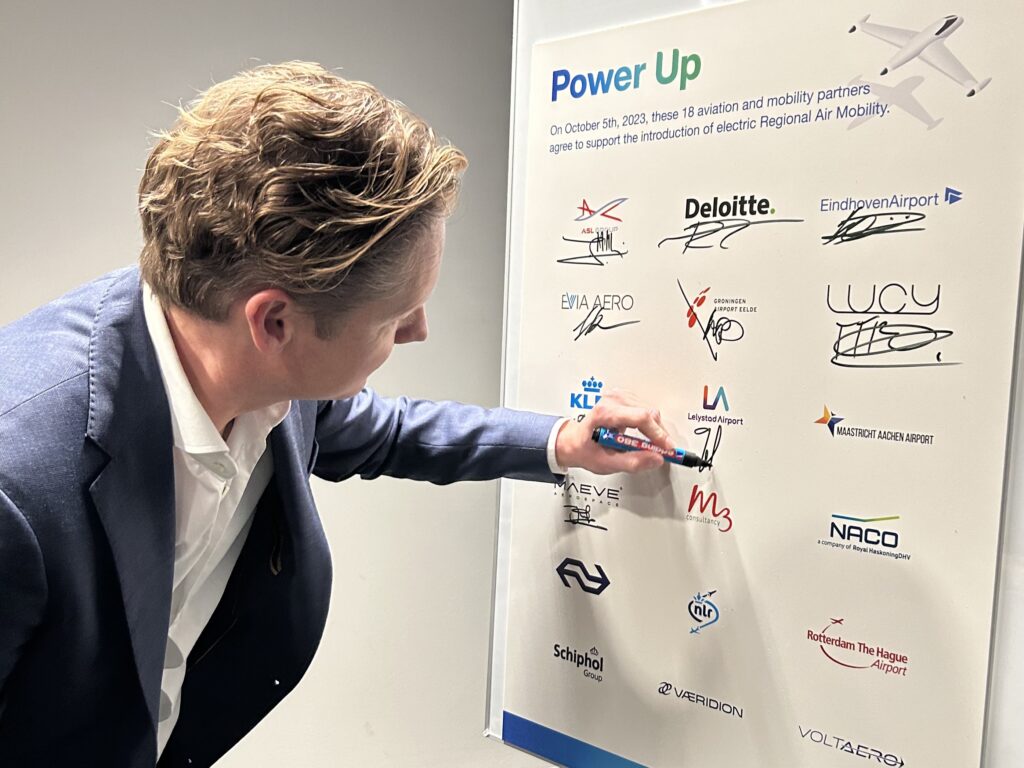
Power Up – 18 aviation and mobility parties support the introduction of electric regional aviation!
A consortium of 18 aviation and mobility organizations, working together under the name Power Up, have committed to supporting a new initiative for efficient, low-CO2, and convenient travel between and to regional airports. By signing a Memorandum of Understanding, Eindhoven Airport, Groningen Airport Eelde, Lelystad Airport, Maastricht Aachen Airport, Rotterdam The Hague Airport, Royal Schiphol Group, along with the ASL Group, LUCY, KLM, Evia Aero, Maeve, Vaeridion, VoltAero, the Dutch Railways (Nederlandse Spoorwegen), Deloitte, M3 Consultancy, NACO, and Royal NLR have agreed to collectively pave the way for the introduction of electric regional aviation.
The partners aim to develop passenger processes and align operational airport procedures together. Regional airports involved in Power Up strive to be operationally ready by 2026, having jointly developed a passenger-friendly product with partners, enabling the organization of the first electric commercial passenger flights thereafter.
Electric regional aviation (eRAM) entails the operation of commercial passenger flights by aircraft with 9 to 50 seats, powered by electric motors driven by batteries, hybrid-electric, or hydrogen-electric propulsion systems, covering distances from 150 to 750 km.
Crash tenders fire brigade on bio-fuel HVO-100
To reduce emissions from the crash tenders at Lelystad Airport, the fire trucks are fueled with the biofuel HVO-100. This helps us reduce CO2 emissions by 89% compared to regular diesel. The abbreviation HVO stands for ‘Hydrotreated Vegetable Oil.’ HVO is produced from waste, residual oils, and fats, in addition to vegetable oils, such as used cooking oil.
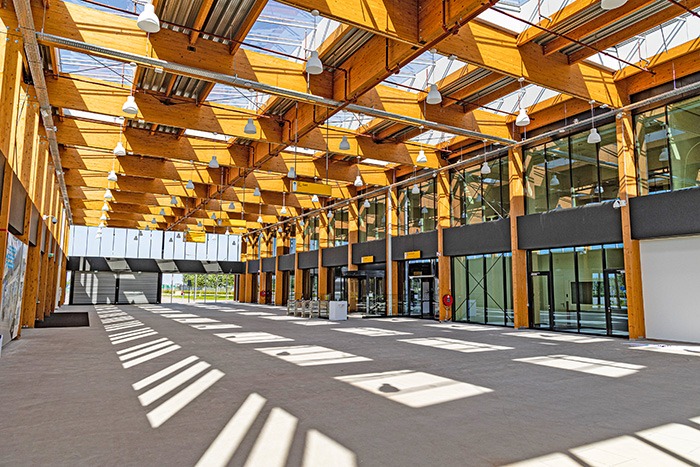
Passenger terminal is one of the most sustainable in the world
In 2019, the passenger terminal obtained the LEED Gold-certification, making the building measurably one of the most sustainable terminals in the world. Efforts have been made to minimise energy consumption.
Spaces where travellers spend only a short time, such as the entrance hall and reclaim, are not air-conditioned. The climate control system is switched on only at security, in the lounge and the waiting area at the gate. An air source heat pump is installed for cooling and heating. The terminal has no gas connection. The building is well insulated, which further reduces energy consumption.

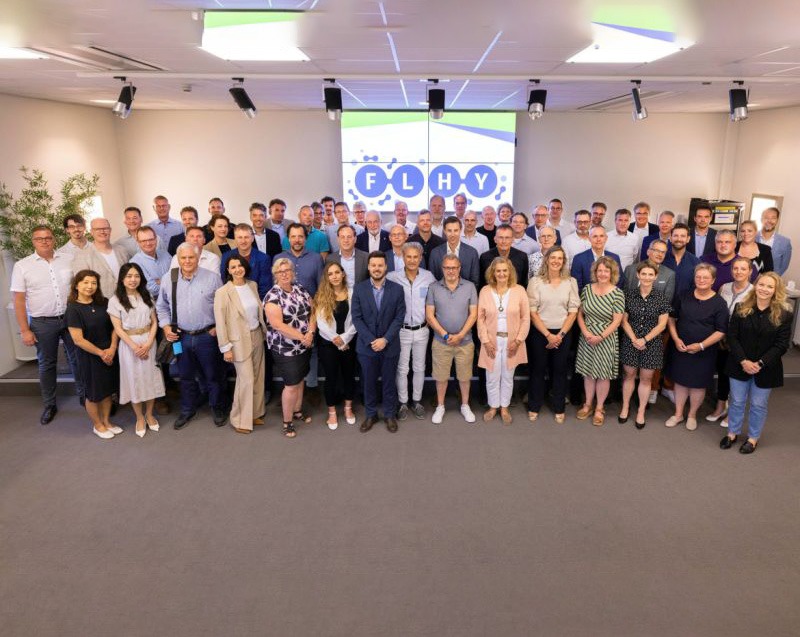
Flevoland Hydrogen Valley (FLHY) platform
FLHY was launched in June 2023 with the aim to jointly grow and prosper the hydrogen economy in Flevoland. Connecting suppliers and buyers of hydrogen will create new business and reduce the use of fossil fuels in Flevoland.
After the summer of 2023, Horizon Flevoland will organise cluster tables for groups of companies to jointly set up innovation projects around the theme of hydrogen.
Flevoland has little energy-using industry, but Flevoland does have Lelystad Airport, many agricultural vehicles that could run on hydrogen, several transport companies, ships and a large power plant: the Maxima power plant in Lelystad. The Maxima power plant is currently being converted to also run on hydrogen. There are many windmills and solar panels in the polder whose power can be used to produce hydrogen at suitable times.

